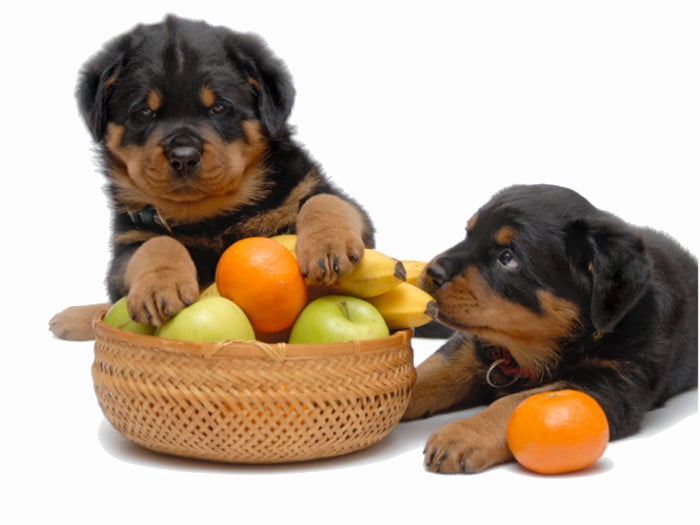People often wonder what vegetable and fruits dogs can eat. While the list is considerably long, there are also some fruits and vegetables that you should definitely avoid giving your dear friend!
Fruits Dogs Can Eat
The fruits dogs can eat include cantaloupe, bananas, cranberries, pears, raspberries, pineapple, apples, and strawberries, among others.
Blueberries
The same reason that blueberries are good for humans holds true for dogs as well. With measurable amounts of resveratrol and other antioxidants, blueberries can work wonders for your overall health. [1]
Bananas
High in potassium and fiber, bananas are a popular treat for dogs and can help to improve their digestion. However, cut the bananas into bite-sized chunks first, to prevent any choking hazard.

Dogs can eat only certain fruits. Photo Credit: Shutterstock
Kiwis
Dogs seem to enjoy the flavor of these fruits, and will also benefit from the high levels of vitamins.
Strawberries
Rich in vitamin C and powerful polyphenolic compounds, as well as fiber and minerals, these fruits are a simple addition to your pooch’s diet. [2]
Pineapple
With its beneficial enzymes, minerals, and antioxidants, this fruit can be an excellent choice for your pooch, provided you cut up the pieces and remove any of the hard eyes from the pineapple rind.
Apples
Good levels of pectin and vitamin C in apples can help to keep your dog energized and healthy, but be sure to core the apples so they avoid choking.
Watermelon
High in water and certain vitamins, such as vitamin A, this fruit is an excellent and easy to digest fruit option in the summer to cool off your pooch.
Oranges
A great source of vitamin C and fiber, you can add this fruit to your dog’s diet as it may help improve their digestive function.
Vegetables that Dogs Can Eat
Dogs can also eat a number of vegetables, including cauliflower, cucumbers, edamame, peas, sweet potatoes, parsley, and zucchini, among others.
Green Beans
These beans are rich in omega-3 fatty acids and a number of minerals, as well as vitamins K, C, and A. However, it is advisable to cook the green beans first, to make them easier to digest.
Sweet Potatoes
If you cook up sweet potatoes and mash them up for your dog, the high levels of beta-carotene and dietary fiber can be a great addition to their diet and immune system.
Kale
Rich in key antioxidants that can protect your dog from various diseases, kale is a delicious and fiber-rich snack.
Broccoli Florets
Broccoli is a nutrient-dense food that contains vitamin A, C, D, beta-carotene, fiber, and calcium. It can help your dog fight various diseases for your dog. It is also a great immune system booster.
Pumpkin
Pumpkin, being a rich source of fiber can help your dog’s digestive system. It also promotes heart health.
Asparagus
Cut the asparagus into small, bite-sized pieces after cooking and feed them to your pup to improve their digestion and provide a boost of vitamins and minerals.
Carrots
Low in calories, but high in vitamin A and beta-carotene, these vegetables can be eaten raw or cooked, but always cut them into small bite-sized pieces.
Edamame
Beans like this are high in nutrients and fiber and are known to settle inflammation in your dog’s body.
Brussels Sprouts
High levels of vitamin C and dietary fiber, as well as vitamin K, can make this a tasty vegetable snack for your canine companion.
Fruits to Avoid
Although there are many fruits that your dog can enjoy in moderation, there are also some that you should skip, including the following. These may contain toxins or compounds that are difficult to digest and could result in serious side effects.
Vegetables to Avoid
There are also some vegetables that you should definitely keep out of reach of your pups, such as:
